- Home
- Jack Canfield
Chicken Soup for Every Mom's Soul Page 4
Chicken Soup for Every Mom's Soul Read online
Page 4
Our history together began over fifty years ago when I was seven years old and we lived across the street from the river in New Richmond, Ohio. In anticipation of high water, the ground floor of the house had been built seven feet above grade.
That December, the river started to overflow west of town. When the water began to rise in a serious way, my parents made plans in case the river should invade our house. My mother decided that she would pack our books and her fine china in a small den off the master bedroom. Each piece of the china had a gold rim and then a band of roses. It was not nearly as good as it was old, but the service had been her mother’s and was precious to her.
As she packed the china with great care, she told me, “You must treasure the things people you love have cherished. It keeps you in touch with them.”
I didn’t really understand her concern. I’d never owned anything I cared all that much about. Still, planning for disaster held considerable fascination for me.
The plan was to move upstairs when the river reached the seventh of the steps that led to the front porch. We would keep a rowboat in the downstairs so that we could get from room to room. The one thing we would not do was leave the house. My father, the town’s only doctor, felt he had to be where sick people could find him.
The muddy water rose higher and higher until at last the critical mark was reached. We worked for days carrying things upstairs, until late one afternoon the water edged over the threshold and poured into our house. I watched it from the safety of the stairs, amazed at how rapidly it rose.
Every day I sat on the landing and watched the river rise. My mother turned a spare bedroom into a makeshift kitchen and cooked simple meals there. My father came and went in a fishing boat that was powered by a small outboard motor.
Before long, the Red Cross began to pitch tents on high ground north of town. “We are staying in our house,” my father said.
One night very late I was awakened by a tearing noise, like timbers creaking. Then I heard the rumbling sound of heavy things falling. I jumped out of bed and ran into the hallway. My parents were standing in the doorway to the den. The floor of the den had fallen through and all the treasures, including my mother’s china, that we had attempted to save, were now on the first floor beneath the steadily rising river.
My mother had been courageous it seemed to me, through the ordeal of the flood. But the loss of the things she loved broke her resolve. That night she sat on the top of the stairs with her head on her crossed arms and cried. My father comforted her as best he could, but she was inconsolable.
My father finally told me to go to bed, and I watched him help my mother to their room. In a few minutes he came to see me, to tell me everything would be all right and that my mother would be fine after a good night’s sleep.
I wasn’t sure about that at all. There was a sound in her weeping that I had never heard before, and it troubled me. I wanted to help her feel better, but I couldn’t think of what I could possibly do.
The next morning she made me breakfast, and I could tell how bad she still felt just by how cheerful she pretended to be.
After breakfast, my mother said I could go downstairs and play in the rowboat. I rowed the boat once around the downstairs, staring into the dark water, but could see nothing. It was right then that I thought of trying to fish for my mother’s china.
I carefully put a hook I cut from a wire coat hanger onto a weighted line. Then I let it sink until I felt it hit bottom. I began to slowly drag it back and forth. I spent the next hour or so moving the boat back and forth, dragging my line, hoping against hope to find one of my mother’s treasures. But time after time I pulled the line up empty.
As the water rose day after day, I continued to try to recover something, anything, of my mother’s lost treasure. Soon, however, the water inside had risen to the stairway landing. On the day the water covered the rain gutters, my father decided we would have to seek shelter in the tents on the hill. A powerboat was to pick us up that afternoon.
I spent the morning hurriedly securing things in my room as best I could. Then I got into my rowboat for the last time. I dragged my line through the water and just as I made the last turn to go back to the stairway, I snagged something.
Holding my breath, I raised my catch to the surface. As the dark water drained from it, I could see it was the gravy boat from my mother’s china service. The bright roses and gold leaf seemed dazzling to me.
Then I saw what had helped my line catch: There was a V-shaped chip missing from the lip of the boat. I stowed the treasure inside my jacket and rowed as fast as I could to the stair landing. My mother had called me for the second time, and I knew better than to risk a third.
We left from the porch roof and the boat headed to higher ground. It began to rain, and for the first time I was really afraid. The water might rise forever, might cover the whole valley, the trees, even the hills. The thought made me cold, and I did not look out at the flood again until we landed at the shelter.
By the time we were settled in a Red Cross tent, we were worn out. My father had gone off to help with the sick people, and my mother sat on my cot with her arm around my shoulder. I reached under my pillow and took out the gravy boat.
She looked at it, then at me. Then she took it in her hands and held it a long time. She was very quiet, just sitting, gazing at the gravy boat. She seemed both very close to me and far away at the same time, as though she were remembering. I don’t know what she was thinking, but she pulled me into her arms and held me very close.
We lived in the tent for almost two weeks, waiting for the flood to end. When the water eventually receded, we did not move back to our old house, but to a house in a suburb of Cincinnati, far from the river.
By Easter, we were settled in and my mother made a special kind of celebration on that sacred Sunday. My mother asked me to say grace, and then my father carved the lamb. My mother went into the kitchen and returned with the gravy boat. Smiling at me, she placed it on the table beside her. I said to myself right then that nothing would ever happen to that gravy boat as long as I lived.
And nothing ever has. Now whenever I use it, guests almost always ask about it and sometimes I tell the whole story—at least most of it. But there really is no way to tell—beyond the events of the flood—how deeply that small treasure connects me to the people and places of my past. It is not only the object but also the connection I cherish. That little porcelain boat, old and chipped, ties me to my mother—just as she said—keeping me in touch with her life, her joy and her love.
W. W. Meade
Mom’s Favorite Child
For weeks, both our mother and our brother had been near death with cancer. Mom and her dying son were inseparable, whether at home or as patients in the same hospital. None of us siblings resented that she turned to him so much during those final days. On a cold day in November, her four remaining sons carried her to his funeral, certain that they were fulfilling her last wish.
The long night that followed was both a horror and a blessing. My oldest sister, Marie, and I stayed with Mom in our childhood home. No matter what we did, Mom wept with grief and writhed with pain. Her cries mingled with the sounds of the icy rain blown against the windows of the old farmhouse, first in gusts, then in brief intermissions of heavy calm. Finally, around three o’clock in the morning, after telling us repeatedly that she would not see another dawn, she closed her eyes. An eerie silence settled over the house, as if death were very close to us again.
When Marie and I saw that she was not dead but was resting peacefully, we knew we should rest too. But we couldn’t sleep and started to talk.
Marie was the second child; I was the ninth and last. The two of us had never even lived in the same house, as she already had her own home when I was born. We looked and acted like members of the same clan, but we had never talked real “soul talk.” In the dim light of the room adjoining Mom’s, she and I whispered stories about our family.
Seeing my mother near death, I felt like a little girl again. I told Marie how I remembered so often the special solace of Mom’s lap. That was my retreat when I sought comfort for aching ears, or refuge from warring siblings, or just the closeness of her hug. To me she was always wonderfully soft and warm.
Marie knew the feeling. The shadows danced on the wall, a background to our animated whispers about childhood— the family struggles, the strict discipline and hard work, the inevitable fights with our siblings.
Then she made a shocking statement.
“It wasn’t really so hard for me, though, because I was always Mom’s favorite.”
I was astounded that she said the word out loud! Mom didn’t have favorites! Yet as I let myself think about it, I had to reply, “I can’t believe you said that . . . I guess I always thought I was her favorite.”
Marie and I both chuckled, each believing that the other had certainly placed second. Then the truth began to unfold, as we continued to swap stories about the calm and loving woman asleep in the next room.
“I have an idea,” I told her. “When the boys get here in the morning, let’s ask them who was her favorite.”
Two of our brothers awakened us at dawn, anxious to see if Mom had made it through the night. She had, and was still dozing. Over coffee at the big family table, I asked them the unspeakable question.
“Marie and I were talking last night, and couldn’t agree on something, so we thought we’d ask you. Who do you think was Mom’s favorite child?”
Coffee mugs stalled in midair. The two men’s eyebrows arched, and their mouths fell open. They squirmed in their chairs and looked out the window as intently as if counting the raindrops. Marie and I waited.
Finally, one brother spoke. “Well, you know Mom never played favorites. . . .” Then, making uneasy eye contact again, he said, “But if I were honest about it, I guess I’d have to say I always thought I was her favorite.”
The second brother, grinning with relief that he didn’t have to say it out loud first, confessed that he thought he was her favorite.
For the first time in months, we all laughed, as only childhood friends can laugh when finding a hidden treasure and sharing the secret.
How did she manage to make each of us feel like the favored child? She never told us we were. She showered none of us with gifts or special privileges. She was not very physically affectionate with us, and “I love you” was not part of daily conversation. But in her quiet way, she had a gift of presence more powerful than words. My husband (knowing secretly that he was her favorite son-in-law) summed it up: “When she was with you, she was all yours, as if you were the most important person in the world. Then she would go on to the next person, all his for a while.”
In those days just before her death, my brothers and sisters and I discovered together what each of us had felt all along. Mom’s love had no limits—each child was her favorite.
Sue Thomas Hegyvary
off the mark by Mark Parisi
www.offthcmark.com
Reprinted by permission of Mark Parisi. ©1993 Mark Parisi.
Letter to Josh
In 1989, several days before my oldest son, Josh’s, eighteenth birthday, I wrote the following piece and sent it to our local paper asking them to print it. They agreed, and it appeared the next day. It read:
My oldest son is celebrating his eighteenth birthday, and I am proud to announce that his father and I are going to survive. Now for all those who have never raised children this might not seem like a big deal, but believe me from my experience this is truly an amazing and wondrous feat.
Dear Josh,
On your thirteenth birthday we watched as you took those first giant rebellious steps toward adulthood. You no longer accepted, unquestioningly, our answers to why you had to be in bed early and why you could not play outside after dark. We began to see small hints of skepticism and humor in eyes that once held only adoration and respect for all we said and did.
And . . . your father and I began to discuss, in depth, the feasibility of sending you to military school until you were eighteen.
On your fourteenth birthday you were no longer content to remain in the neighborhood. You wanted to claim the whole world as your domain, and your ever-widening circle of friends now contained names we did not know. We reluctantly accepted your mad dashes to answer the phone (acknowledging that most of the phone calls were now for you anyway) and on the few occasions when we did answer, it seemed strange to hear girls’ voices asking for you.
And . . . your father and I began to consider in earnest calling several well-established adoption agencies (including the local humane society) to see if they would accept you for the next four years.
When you turned fifteen we learned of all-night skating and midnight bowling, that no one goes to the early movies and everyone lives at the mall. Our conversations with you became minimal and usually turned into heated debates. Pros and cons rang through the house. Your sentences began with “All my friends are doing it” and ended with “Wait till I’m eighteen.”
And . . . your father and I began to seriously contemplate running away.
It was on your sixteenth birthday that a very real panic began to set in as you proudly announced to all who would listen that you were going to get your driver’s license. I stood there in shock, numbly thinking, This kid wants my car keys, and remembering all the Band-Aids, every tube of first-aid cream and the numerous trips to the emergency room as you gradually worked your way from the stroller to tricycles, from big-wheels to bicycles, to roller skates and ice skates, skateboards and snow sleds.
And . . . your father and I decided that, when we did run away, we were taking both of the cars with us.
Your seventeenth birthday brought more changes. It seemed the only time we saw you was when you were hungry or needed to use the car. The refrigerator hated to see you coming and we hated to see you go. Our conversations now centered around college versus the armed forces, and we felt a little lost when we took our first family vacation without you.
But, Josh, we are truly proud of the man you have become, of your many accomplishments, the awards and trophies you have received over the years and your involvement in so many wonderful organizations.
And now . . . your father and I watch with equal measures of pride and apprehension as you walk out into that world you wanted to claim as your domain so long ago.
Happy birthday, Josh.
Love,
Mom and Dad
Initially we intended to give Josh a mild ribbing—he was a kid who loved to instigate and loved a good laugh, even when the joke was on him. But it became a way of letting him know that I believed in him and supported him in the hard decisions coming up as he entered the adult world with all its complexities and challenges.
Now I regard it as a loving reminder of a time that passed all too quickly.
My daring toddler, my lovable little boy, my wonderful rambunctious teenager, Joshua, died when he was twenty-one.
Linda Masters
My Mother’s Blue Bowl
Visitors to my house are often served food—soup, potatoes, rice—in a large blue stoneware bowl, noticeably chipped at the rim. It is perhaps the most precious thing I own. My mother gave it to me in her last healthy days. The days before a massive stroke laid her low and left her almost speechless.
For much of her life my mother longed, passionately, for a decent house. One with a yard that did not have to be cleared with an ax. One with a roof that kept out the rain. One with floors that you could not fall through. She longed for a beautiful house of wood or stone. Or of red brick, like the houses her many sisters and their husbands had. When I was thirteen, she found such a house. Green shuttered, white walled. Breezy. With a lawn and hedge and giant pecan trees. A porch swing. There her gardens flourished in spite of the shade, as did her youngest daughter, for whom she sacrificed her life doing hard labor in someone else’s house in order to afford peace and
prettiness for her child, to whose grateful embrace she returned each night.
But, curiously, the minute I left home, at seventeen, to attend college, she abandoned the dream house and moved into the projects. Into a small, tight apartment of few breezes, in which I was never to feel comfortable, but that she declared suited her “to a T.” I took solace in the fact that it was at least hugged by a spacious lawn on one side, and by forest out the back door, and that its isolated position at the end of the street meant she would have a measure of privacy.
Her move into the projects—the best housing poor black people in the South ever had, she would occasionally declare, even as my father struggled to adjust to the cramped rooms and hard, unforgiving qualities of brick— was, I now understand, a step in the direction of lightening her load, permitting her worldly possessions to dwindle in significance and roll away from her, well before she herself would turn to spirit.
She owned little, in fact. A dresser, some chairs. A set of living-room furniture. A set of kitchen furniture. A bed and wardrobe (given to her years before, when I was a teenager, by one of her more prosperous sisters). Her flowers: everywhere, inside the house and outside. Planted in anything she managed to get her green hands on, including old suitcases and abandoned shoes. She recycled everything, effortlessly. And gradually she had only a small amount of stuff—mostly stuff her children gave her: nightgowns, perfumes, a microwave—to recycle or to use.
Each time I visited her, I marveled at the modesty of her desires. She appeared to have barely any, beyond a thirst for a Pepsi-Cola or a hunger for a piece of fried chicken or fish. On every visit I noticed that more and more of what I remembered of her possessions seemed to be missing. One day I commented on this.
Taking a deep breath, sighing, and following both with a beaming big smile, which lit up her face, the room and my heart, she said, “Yes, it’s all going. I don’t need it anymore. If there’s anything you want, take it when you leave; it might not be here when you come back.” But there was nothing there for me to want.

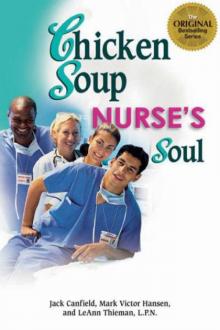 Chicken Soup for the Nurse's Soul: Second Dose
Chicken Soup for the Nurse's Soul: Second Dose Chicken Soup for the Ocean Lover's Soul
Chicken Soup for the Ocean Lover's Soul A 2nd Helping of Chicken Soup for the Soul
A 2nd Helping of Chicken Soup for the Soul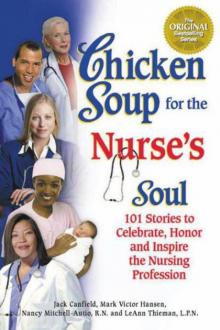 Chicken Soup for the Nurse's Soul
Chicken Soup for the Nurse's Soul Chicken Soup for the Breast Cancer Survivor's Soul
Chicken Soup for the Breast Cancer Survivor's Soul Chicken Soup for the Pet Lover's Soul
Chicken Soup for the Pet Lover's Soul Chicken Soup for the Bride's Soul
Chicken Soup for the Bride's Soul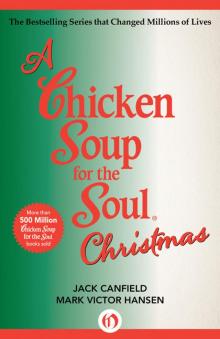 A Chicken Soup for the Soul Christmas
A Chicken Soup for the Soul Christmas Chicken Soup for the Soul of America
Chicken Soup for the Soul of America Chicken Soup for the Teenage Soul on Tough Stuff
Chicken Soup for the Teenage Soul on Tough Stuff A Taste of Chicken Soup for the Teenage Soul III
A Taste of Chicken Soup for the Teenage Soul III Chicken Soup for Every Mom's Soul
Chicken Soup for Every Mom's Soul Chicken Soup for the Dog Lover's Soul
Chicken Soup for the Dog Lover's Soul A Second Chicken Soup for the Woman's Soul
A Second Chicken Soup for the Woman's Soul Chicken Soup for the Soul the Book of Christmas Virtues
Chicken Soup for the Soul the Book of Christmas Virtues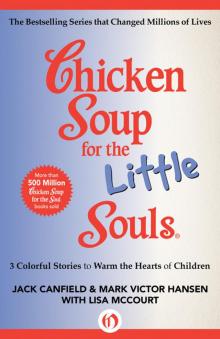 Chicken Soup for the Little Souls: 3 Colorful Stories to Warm the Hearts of Children
Chicken Soup for the Little Souls: 3 Colorful Stories to Warm the Hearts of Children Chicken Soup for the African American Woman's Soul
Chicken Soup for the African American Woman's Soul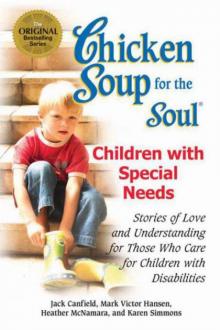 Chicken Soup for the Soul
Chicken Soup for the Soul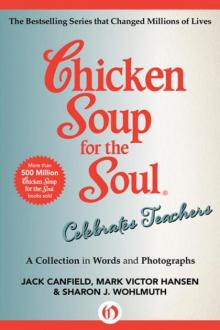 Chicken Soup for the Soul Celebrates Teachers
Chicken Soup for the Soul Celebrates Teachers Chicken Soup for the College Soul
Chicken Soup for the College Soul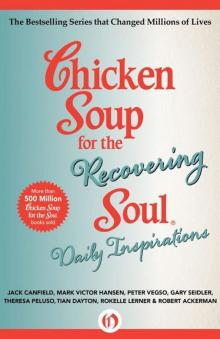 Chicken Soup for the Recovering Soul Daily Inspirations
Chicken Soup for the Recovering Soul Daily Inspirations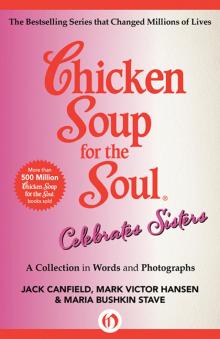 Chicken Soup for the Soul Celebrates Sisters
Chicken Soup for the Soul Celebrates Sisters Chicken Soup for the Dieter's Soul
Chicken Soup for the Dieter's Soul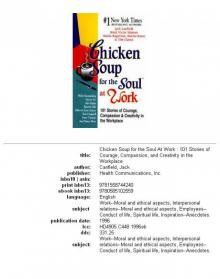 Chicken Soup for the Soul at Work 101 Stories of Courage
Chicken Soup for the Soul at Work 101 Stories of Courage Chicken Soup for the Beach Lover's Soul
Chicken Soup for the Beach Lover's Soul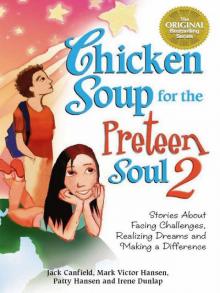 Stories About Facing Challenges, Realizing Dreams and Making a Difference
Stories About Facing Challenges, Realizing Dreams and Making a Difference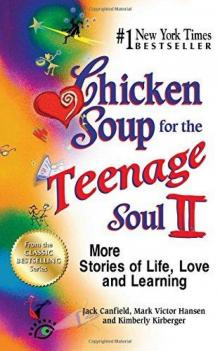 Chicken Soup for the Teenage Soul II
Chicken Soup for the Teenage Soul II Chicken Soup for the Girl's Soul
Chicken Soup for the Girl's Soul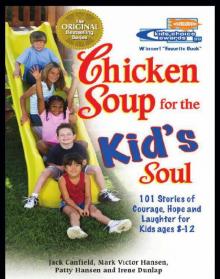 Chicken Soup for the Kid's Soul: 101 Stories of Courage, Hope and Laughter
Chicken Soup for the Kid's Soul: 101 Stories of Courage, Hope and Laughter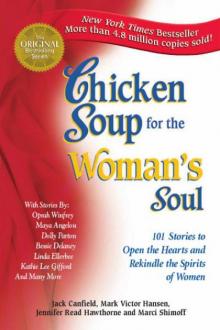 Chicken Soup for the Woman's Soul
Chicken Soup for the Woman's Soul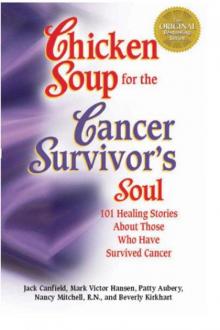 Chicken Soup for the Cancer Survivor's Soul
Chicken Soup for the Cancer Survivor's Soul Chicken Soup for the Canadian Soul
Chicken Soup for the Canadian Soul Chicken Soup for the Military Wife's Soul
Chicken Soup for the Military Wife's Soul A 4th Course of Chicken Soup for the Soul
A 4th Course of Chicken Soup for the Soul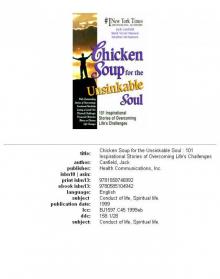 Chicken Soup Unsinkable Soul
Chicken Soup Unsinkable Soul Chicken Soup for the Soul: Christmas Magic
Chicken Soup for the Soul: Christmas Magic Chicken Soup for the Grandma's Soul
Chicken Soup for the Grandma's Soul Chicken Soup for the Soul: All Your Favorite Original Stories
Chicken Soup for the Soul: All Your Favorite Original Stories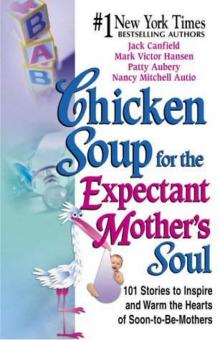 Chicken Soup for the Expectant Mother's Soul
Chicken Soup for the Expectant Mother's Soul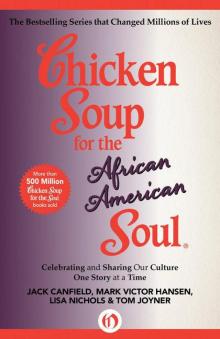 Chicken Soup for the African American Soul
Chicken Soup for the African American Soul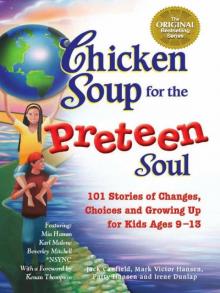 101 Stories of Changes, Choices and Growing Up for Kids Ages 9-13
101 Stories of Changes, Choices and Growing Up for Kids Ages 9-13 Christmas Magic
Christmas Magic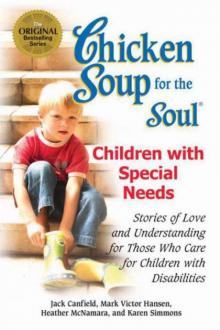 Chicken Soup for the Soul: Children with Special Needs
Chicken Soup for the Soul: Children with Special Needs Chicken Soup for the Soul: Country Music: The Inspirational Stories behind 101 of Your Favorite Country Songs
Chicken Soup for the Soul: Country Music: The Inspirational Stories behind 101 of Your Favorite Country Songs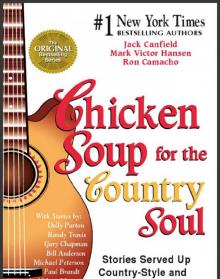 Chicken Soup for the Country Soul
Chicken Soup for the Country Soul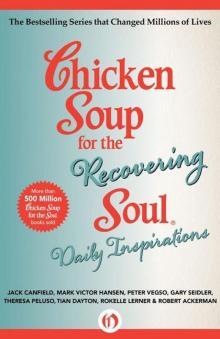 Chicken Soup for the Recovering Soul Daily Inspirations (Chicken Soup for the Soul)
Chicken Soup for the Recovering Soul Daily Inspirations (Chicken Soup for the Soul)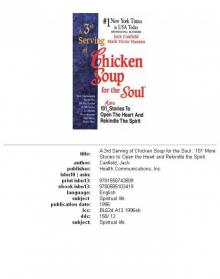 A 3rd Serving of Chicken Soup for the Soul
A 3rd Serving of Chicken Soup for the Soul The Book of Christmas Virtues
The Book of Christmas Virtues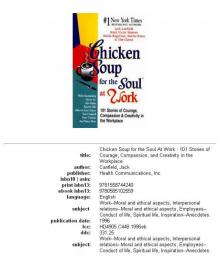 Chicken Soup for the Soul at Work
Chicken Soup for the Soul at Work Chicken Soup for the Soul 20th Anniversary Edition
Chicken Soup for the Soul 20th Anniversary Edition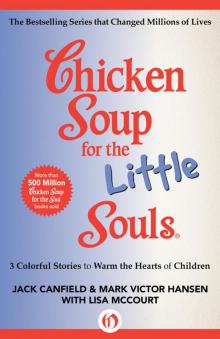 Chicken Soup for the Little Souls
Chicken Soup for the Little Souls Chicken Soup for the Soul: Reader's Choice 20th Anniversary Edition
Chicken Soup for the Soul: Reader's Choice 20th Anniversary Edition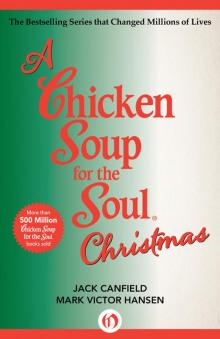 Chicken Soup for the Soul Christmas
Chicken Soup for the Soul Christmas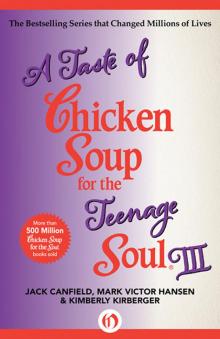 Taste of Chicken Soup for the Teenage Soul III
Taste of Chicken Soup for the Teenage Soul III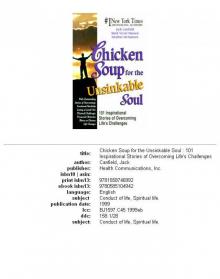 Chicken Soup for the Unsinkable Soul
Chicken Soup for the Unsinkable Soul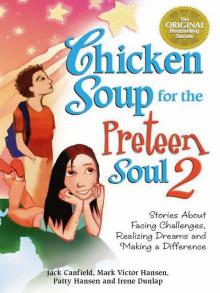 Chicken Soup for the Preteen Soul II
Chicken Soup for the Preteen Soul II